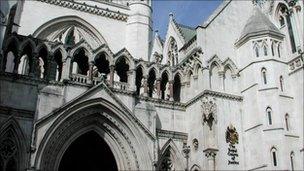Landmark divorce ruling on hidden money
- Published

The ruling at the Court of Appeal has been described as "ground-breaking"
Protection previously afforded to thousands of people in divorce proceedings has been removed following a landmark Court of Appeal judgement.
Until now a husband or wife who came across information showing their partner was hiding money could copy it, use it and put it before the courts.
But the court reversed the principle, intended to help the financially weak, in a case involving a millionaire.
Lawyers have described the judgement as "ground-breaking".
It comes after property tycoons Robert and Vincent Tchenguiz attempted to use information about the financial affairs of their sister's multi-millionaire husband at her divorce hearing.
Following the ruling, they must comply with a High Court order to hand back to Vivian Imerman the documents copied from a computer.
Mr Imerman, a businessman, shared the Mayfair offices and a computer with the brothers from 2002 until February last year when he and his staff were evicted.
He successfully claimed that the brothers, two IT staff and a solicitor had no right to retain or use the material which was downloaded without his knowledge.
'Unintended consequences'
Mr Imerman's lawyers claimed the Court of Appeal's "ground-breaking" ruling on divorce money would revolutionise disclosure in documents in family law cases.
In a statement, Mr Imerman - who married in 2001 - said: "I regret that this matter had to be put before the courts. It has been a waste of everybody's time and money, but I was determined that my private papers could not be stolen and the perpetrators get away with it without retribution."
The Hildebrand rules had allowed wives and husbands to secretly obtain, copy and use documents in divorce proceedings.
But Lord Neuberger, who as Master of the Rolls heads the civil appeals division, ruled that they are unlawful, saying: "It follows that nothing in the so-called Hildebrand rules can be relied upon in justification of, or as providing a defence to, conduct which would otherwise be criminal or actionable."
Divorce lawyers said the judgement would mean that in future any attempt by one side in a divorce case to take documents without permission would result in heavy costs orders or criminal proceedings.
Mrs Imerman's solicitors, Withers, argued that the court's ruling had completely reversed the protection once given to wives.
A Withers spokesman said in the past 10 years the law on divorce had moved from meeting the financially weaker party's "reasonable needs" to giving 50% of all funds built up during a marriage as a starting point.
He said: "An unintended consequence has been to incentivise the financially stronger party (typically the husband) to lie: every pound hidden saves parting with half of it.
"Wives have until now been allowed to produce an ace from their sleeve: a document proving the husband had lied about his finances was admissible in evidence even if improperly obtained."